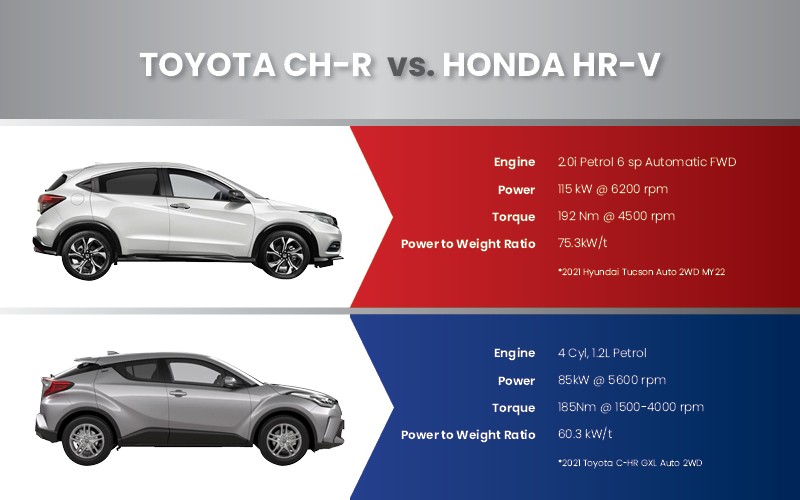
2021 Toyota C-HR vs Honda HR-V
The C-HR and the HR-V are both at different stages of their evolution, which in some ways makes comparison a challenge.
Benefiting from a dramatic external makeover and with the option of Toyota's ground-breaking hybrid tech, the C-HR is at the top of its game in 2021.
In contrast, the HR-V is in its final year before a dramatic makeover that's planned for 2022. It's had some mild upgrades compared with 2020, but there is much that's unchanged from when the model was introduced back in 2014.
Here we take a look at the pros and cons of each vehicle. This should give you the information needed to decide which of these two small SUVs is going to be best suited to your circumstances.
The Basics
Toyota has focused on the look of the CH-R, aiming for a fun, funky vibe that you either love or hate. The vehicle features modern hybrid technology, comprehensive safety features and excellent fuel efficiency. It's a stylish addition to the small SUV range.
The HR-V has had a much-needed tech upgrade for 2021 - the 7" infotainment screen is now integrated into the interior trim, for example. This vehicle is famed for its roomy (by small SUV standards) interior and spacious luggage area. Its excellent use of interior space continues to be one of its main selling points.
See Our Full Review of The 2021 Toyota CH-R
Interior
The C-HR's interior benefits from sophisticated styling and an intelligent, ergonomic layout. The Toyota's cabin has the option of leather accents in the Koba. Soft-touch, textured materials and an appealing driving position are further benefits. For front-row passengers, the Toyota's cabin is a great place to spend time.
Unfortunately, the same can't be said about the second row - flamboyant exterior curves result in limited headroom inside. Be warned, taller second-row passengers will struggle! Also, the rear windows are small and set too far forward for easy outward viewing. The sloping roof makes rear-seat travel uncomfortable and claustrophobic, especially for taller passengers. The dark upholstery and lack of air vents are further downsides of the Toyota's rear.
Boot space is adequate, but not exceptional.
Like the C-HR, the HR-V is well laid out, with excellent storage. If you like your tech, you'll be disappointed by the 7" infotainment screen - it does offer Apple Carplay and Android Auto but doesn't have GPS. The screen has also been branded "fuzzy and slow" by reviewers.
Where the HR-V does shine is in the rear-row layout. Spacious by small SUV standards, the roof has raised points to provide an extra few inches to accommodate taller passengers. There's also a surprising amount of legroom and rear row passengers can see out, which is a big improvement over the Toyota!
Rear storage is good - the back-row seats can fold back to provide significant storage in the cabin, or fold forward to increase boot space. These "magic" seats are a strong point of the HR-V.
Related Article: 2021 Honda CR-V Review
Exterior
Toyota has put a lot of effort into the C-HR's exterior - it's flared, curved, dropped, and grilled to the max! The end result is extremely striking but in a polarizing way. Most motorists will either love the bold, in-your-face styling or run a mile in search of something more discreet! For the runners, the HR-V could be the perfect solution!
The HR-V has an attractive, albeit unremarkable exterior. It's not going to get many points of its looks alone, although if you want a sporty vibe, the RS comes with a sporty trim that can add a bit of street cred.
Performance
Broadly, reviewers have rated both cars highly. The C-HR comes with either a 1.2l turbo petrol engine (6.6l/100km) or a 1.8k hybrid (4.3/100km). The GR sport model is only available with the hybrid engine, which may feel paradoxical, but it does seem to do the job.
Performance is generally good, but be aware that the same engine powers the luxury Koba as is used in the GR sport model. It's debatable whether the tuned suspension is going to make a marked difference to speed and handling, despite the "sport" moniker.
The HR-V comes in four different models, all of which are powered by a naturally aspirated 1.8l IVTEC engine (6.7l/100km). Reviewers praise its responsiveness but were less impressed by its acceleration and power. The verdict appeared to be that the HR-V can keep up, but it's unlikely that the HR-V is going to break any speed records.

Highlights
Toyota C-HR
- Powerful engine for its size, as well as the option of hybrid technology.
- Heavily styled exterior
- High-spec interior.
- Strong suite of autonomous driving safety features.
Honda HR-V
- Excellent second-row seating experience.
- Large amount of interior and boot storage space (including the "magic seats").
Why You Should buy the Toyota C-HR
Where the Toyota scores highly are on its impressive exterior and its tech. If you want a light-hearted vehicle that's a fun drive and incorporates some high-grade tech, the C-HR is going to work well for you. Ideal for one or two passengers, this is an SUV that is great for shorter trips and the urban environment.
The reliance on tech may be a deterrent to motorists who prefer to use their own judgement. For example, the C-HR's rear visibility is very limited, making the use of the rear-view camera an essential rather than a luxury).
The issues with the second-row seating mean this isn't the best choice for drivers who transport adults or older children in the back.
Looking For An SUV Under $30,000? See The 7 Best Options
Why You Should buy the Honda HR-V
If you value space, the HR-V is exceptional! Offering arguably one of the most comfortable rear seat driving experiences of any small SUV, storage space is also excellent.
Boot space is extremely generous, with the versatile "magic seats" really opening up the options when it comes to transporting a wide variety of goods on board. This is the sort of vehicle that could meet the needs of a small business when it comes to transporting products, tools or materials, as well as provide a great option for the school run.
The HR-V is respectably fuel-efficient and, whilst not the fastest or most powerful SUV on the planet, is definitely not a slouch.
For drivers who want a versatile SUV that corners the market when it comes to space and rear-seat comfort, the HR-V is going to be the best choice.
Looking For A Small SUV? Discover The Top 7 Small SUVs in Australia.
Final Verdict
Ultimately, the final choice will come down to which facets of the overall SUV "job description" are most important to you.
Originally, SUVs were intended to provide the crossover between a robust, all-terrain vehicle and a conventional car - a vehicle that could take a family and its kit into the wilderness, as well as be an asset to the daily commute.
Over the years, this interpretation has shifted, with modern SUVs often more highly prized for their styling and urban versatility rather than their ability to carry passengers and luggage wherever you need it to go.
This change in the interpretation of the SUV remit in Australia sums up the difference between the C-HR and the HR-V. Stylish urban drivers will love the visual appeal and advanced tech of the Toyota, whilst traditional SUV owners will prize the space, comfort and versatility of the HR-V. Neither is "better" than the other - both bring their own strengths that will appeal to a particular audience.
You can find a Toyota CH-R or Honda HR-V on OnlyCars.com.au at a great price, with financing options available through Credit One - Australia's best-rated finance broker.


